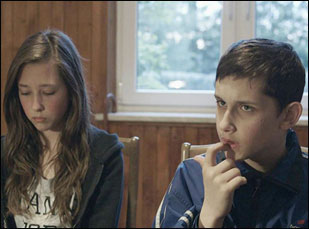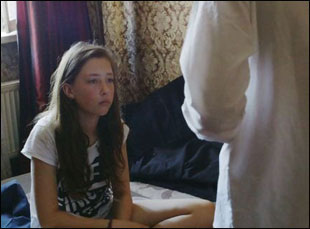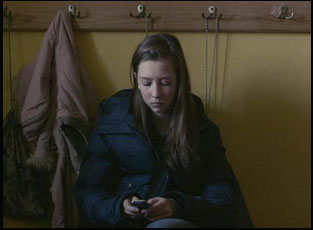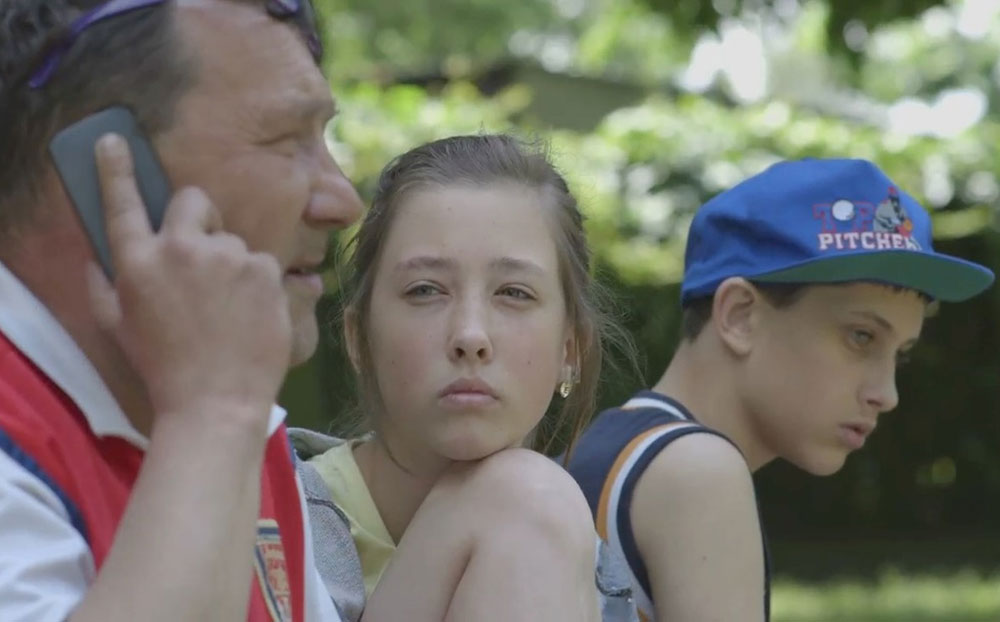In the early stages of thinking about how she would make “Communion,” Anna Zamecka posed a simple question to herself — what does it mean to be a grownup?
“Probably everybody has their own answers, but to me, to be a grownup is to be more accepting of reality,” says Zamecka. “We’re not fighting for something and it’s impossible. We are accepting reality as it is.”
This was true of the maturation Zamecka bears witness to in “Communion,” observing a 12-year-old named Ola take responsibility of her younger brother Nikodem after their parents separate and their mother Magda leaves the house, but also as a filmmaker attempting to convey a story that was beyond her control. The first-time director shows a remarkable command of the screen, carefully composing shots of Ola and Nikodem to reflect their isolation in a world where they have no agency and are subject to the whims of adults who can behave as carelessly as you’d expect of children. However, she couldn’t have possibly known where things would go after a chance encounter with Ola and Nikodem’s father Marek at a train station in 2012, filming tourists as they were filing in and out of the UEFA Euro Soccer Tournament.
Although Zamecka structures the film around the religious rite of passage alluded to by the title, “Communion” truly takes shape around Ola gradually coming to terms with her circumstances, making the heartbreaking realization that she must let go of relying on either Marek, who drinks heavily, or the largely absent Magda to care for Nikodem, a bright, hyperactive child showing signs of autism, let alone her. Yet Zamecka treats them with the respect they deserve, yielding an extraordinary intimate film, present for the clashes between Ola and her family as well as the quiet moments when she attempts to make sense of the world with no one there to guide her. Recently, Zamecka was in the US to reflect on making the film after it shortlisted by the Academy as a finalist for Best Documentary Film and spoke about what should could plan for in making the film, earning the trust of her subjects and how she was able to tell a personal story through the real life travails of another young woman.

It was a bit of a coincidence that we met actually. [Marek] had a very strong, interesting face. There was something in him that I was very intrigued by, so I knew I wanted to meet this person. I approached him and [when] we started to speak, he told me about his kids, particularly about Ola and how he would never do anything without her. At that time I was working on a short fiction film about children [who have to grow up fast], closely related to your own experience. Although my situation was different from Ola’s, I had to similarly take care of my younger brother and understood the emotional burden of when you are a kid and have to take care of someone much younger than you. When [Marek] told me about Ola that she was his partner, she was a mother to her younger brother sounded very familiar and I was thinking to myself I’d like to meet her – not [necessarily] to make a film, but just to maybe get inspired for my short fiction film, so I asked if I could visit them and he agreed.
At True/False, you said Ola was distrustful of adults, which is completely understandable given the situation with her parents. Was there a point where you thought she was comfortable with you?
It’s true that it took me a lot of time to get her trust. I didn’t want to use any tricks. I wanted her to feel safe and comfortable with me. So I spent a lot of time with her without the camera, not only to gain her trust, but also [because] I was working out the story and needed to deeply understand this family. I didn’t live with them, but I was spending a lot of time at their place, observing them in different situations, especially how they react emotionally. During this time I developed my idea for the camerawork, that it would follow emotions, not action. It was very important to me not to make this film about social problems – I wanted to have the emotions of the kids in the center, so for instance when you have the scenes with the social worker visiting them, we’re not seeing the social worker because he’s a representative of the system that is not effective, and this family in particular and those kids are very alone in the situation, so that’s why I’m keeping them out of the frame. We just see Ola’s face in the center of the frame and in this face, you can see everything. You can see the system failing this family all the time. The decision for the camera was born before we started to shoot.
As I remember, you also added film grain, even though this was shot on digital, which gives it a real tactile, timeless quality.
My dream was to shoot this on film, but that wasn’t possible for financial reasons. With my [cinematographer] we didn’t like a digital grain, so we put film grain scanned from 35mm [film]

It evolved. I could speak about many things there because there were many conflicts in this family, but of course you have to choose something and I knew from the beginning, I’m speaking about this child who is dreaming about a perfect family, meaning safety and love and those kind of fundamental human needs. [but I wondered] how to speak about the longing of this girl. It took me some time, but I remember I was following Nikodem to school and I discovered his religious notebooks, full of amazing entries, like for instance, Nikodem wrote his own ten commandments, and this inspired me to think about looking for something around this topic. I also wanted to show Nikodem as a very creative person, not this disabled character that we empathize with in a way where we feel sorry for him because he is autistic, but somebody who is very rock ’n’ roll and creative. To me, he was a kind of prophet from the beginning – somebody who knows much better than us because he sees much more and I wanted an audience to see that he is maybe the only normal one in this crazy world.
I [met] Nikodem when he was eight, and this is the age when kids in Poland are having this first holy communion. As a Catholic country, [something like] 97% of kids have a First Holy communion, but I learned Nikodem wasn’t accepted by the priests, so he didn’t have this, and I sensed for the family, it’s a problem because Ola and the father didn’t want him to stand out from other kids, so if everybody has communion of course, they wanted him to have communion as well because this is something that everybody in Poland does. They didn’t know who they should speak with about [getting one for Nikodem], and I was sure there was a church in Poland that would accept him. So I proposed that if they are interested, we could find the church.
Of course, I realized it’s a perfect [story] line – this preparation for this first holy communion – because in Poland, this first holy communion is a religious event but first [and foremost] it’s a family event, so it would bring the family [together] and they would meet at this table. That was the most important, but also [the idea of] communion was very symbolic because this is a coming-of-age film and communion as I understand it is not about a first holy communion, but it’s a communion as a bond and a metaphor of growing up. So [the event] of this first holy communion all had these elements, and when I encouraged them to try, they were very positive towards this idea. And they gave me a permission to film the whole process.

“Communion” was shot in 35 days over the course of a year. The editing process was very long. And it was the very first film I was shooting having never gone to film school. I was quite stressed and I had to be very disciplined, so I had to know exactly what scenes I needed to tell this story and to speak about these emotions. That’s why I spent a lot of time with [the family], but also when I was editing this film, it wasn’t like I was looking for a [structure] for the story when I was editing because it was already there. What was most important was the pace and the rhythm of editing and editing was like a meditation process for me and my editor, Agnieszka Glińska. She is a very sensitive editor, [who typically does] fiction, and I wanted to have this feeling that you don’t know really if it’s a fiction or a documentary film. You’re just watching a story.
What’s it’s been like traveling with this?
This year I didn’t travel because I wanted to focus on new challenges, but 2017 was really amazing because the film had a [theatrical] release in places like Japan, so I would [travel there] for a couple of days to meet the audience and journalists and I was very surprised [for] a culture so different from Europe, this film was absolutely understandable for them. With any culture, you have something like First Holy Communion and I wanted to depict in this film the emotional burden [of caring for someone] that’s so common very universal. You have millions in society [who are doing it], so I wanted to speak on this and show that these kids [who have to raise a family], what they need to hear is not that they are very heroic and brave and so on, but that this is a burden that they shouldn’t have to carry, that they have a right to be just children. I wanted Ola to hear this message. And I was very pleased to realize that I managed to make something very universal and that this film has the same impact emotionally for anybody anywhere in the world.
“Communion” is screening throughout the U.S. A full list of screenings is here.




